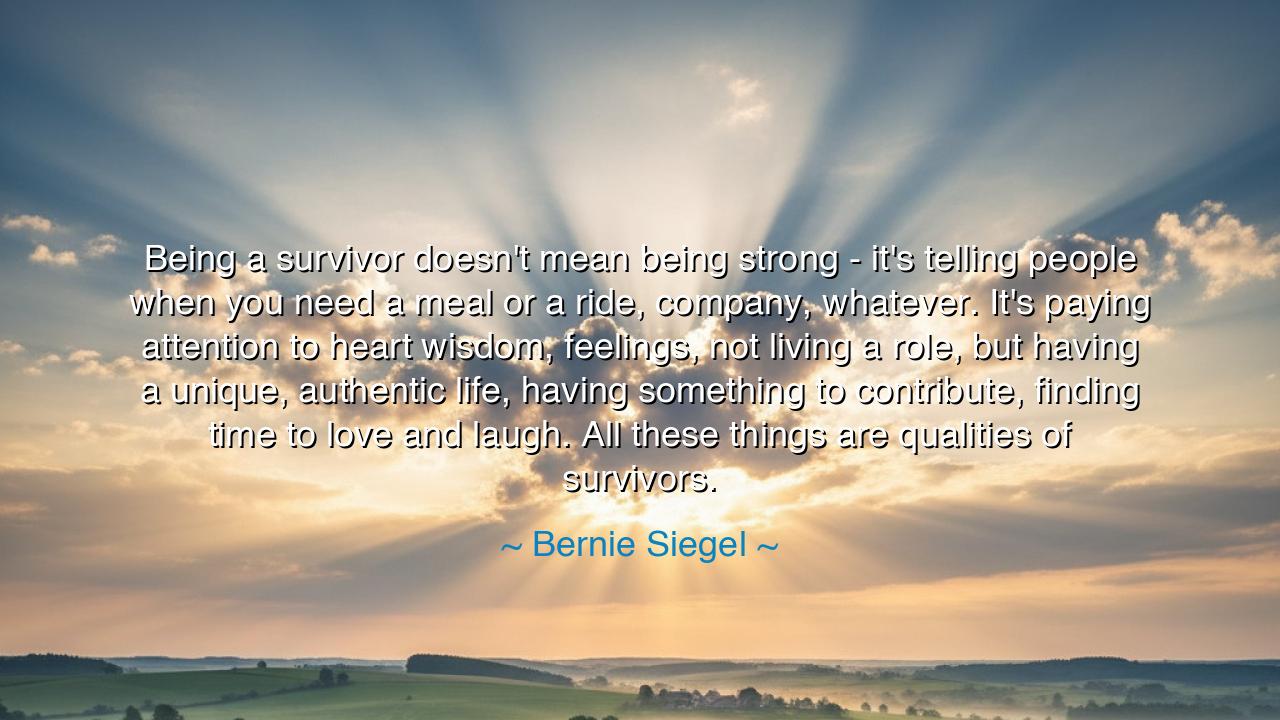
Being a survivor doesn't mean being strong - it's telling people
Being a survivor doesn't mean being strong - it's telling people when you need a meal or a ride, company, whatever. It's paying attention to heart wisdom, feelings, not living a role, but having a unique, authentic life, having something to contribute, finding time to love and laugh. All these things are qualities of survivors.






Bernie Siegel, healer of bodies and souls, spoke with deep tenderness when he declared: “Being a survivor doesn't mean being strong - it's telling people when you need a meal or a ride, company, whatever. It's paying attention to heart wisdom, feelings, not living a role, but having a unique, authentic life, having something to contribute, finding time to love and laugh. All these things are qualities of survivors.” In these words, he dismantles the illusion that survival is merely about brute strength or stoic endurance. Instead, he reveals that true survival is rooted in humility, connection, and the courage to live authentically.
The world often praises the image of the unyielding warrior who suffers in silence. But Siegel reminds us that survivors are not those who never bend, but those who allow themselves to lean on others when weary. To ask for help is not weakness but wisdom—it honors the truth that humanity was never meant to walk alone. This is the essence of heart wisdom, which listens not to pride, but to the needs of the soul.
History shines with examples of this truth. Consider the story of the Holocaust survivors. Those who endured did not do so by strength alone, for no man or woman can carry such suffering unaided. They survived by helping one another, by sharing scraps of bread, by whispering words of hope, by remembering love even in the valley of death. Afterward, many built lives not by hiding their scars, but by embracing them, contributing their voices so the world would not forget. Their survival was not silent endurance, but the rediscovery of laughter, of family, of human connection.
So too in the realm of illness, those who have faced cancer or chronic disease often testify that authentic living—not pretense, not roles—sustains them. Siegel, as a physician, witnessed that survival was not measured by the absence of pain, but by the presence of meaning. To laugh, to love, to ask for companionship—these are the secret weapons of those who endure. Such qualities of survivors are not forged in steel but in tenderness, not in isolation but in belonging.
O children of tomorrow, hear this counsel: do not think survival is a cold, solitary march. To survive is to live with open heart, to embrace your need and your gift alike, to weave yourself into the fabric of others’ lives. It is to claim your authentic life, to bring forth what only you can contribute, and to find joy even after sorrow. This is the wisdom Siegel offers—that survival is not about being unbreakable, but about being whole, human, and true.






MPTrinh Mai Phuong
This makes me consider the difference between being resilient and merely enduring. Survivorship here is framed as an active, engaged, and relational process, not just personal strength. I wonder about the barriers that prevent people from fully experiencing this kind of survival—fear, stigma, isolation. What strategies can help survivors develop these qualities of heart wisdom, authenticity, and contribution, while also finding time for simple joys like love and laughter?
Nnguyendoanh
I feel inspired yet slightly challenged reading this. It highlights that survival involves more than personal endurance; it’s about community, vulnerability, and joy. But it also raises questions about societal structures: do modern systems encourage survivors to thrive authentically, or do they pressure them into roles that undermine genuine expression? How can caregivers, friends, or policymakers help survivors embrace these qualities in meaningful, sustainable ways?
TKtrung kiet
This quote makes me reflect on what it really means to live an authentic life after hardship. It seems that surviving is more about aligning with one’s heart and feelings than adhering to societal expectations. I’m curious how people can cultivate these qualities—love, laughter, contribution—while dealing with ongoing stress or trauma. Is there a balance between healing oneself and actively contributing to others without becoming overwhelmed?
NNNguyen Ngan
Reading this evokes a sense of relief and validation. It’s comforting to think that survival includes asking for support and nurturing authentic connections. But I also wonder, how can survivors overcome the shame or fear that often prevents them from seeking help? Are there practical steps or mindsets that encourage reaching out without feeling weak, and how can society shift its perception of strength to include these softer yet essential qualities?
GDGold D.dragon
This perspective challenges the traditional notion of survival as sheer strength. It makes me wonder how society often undervalues emotional openness and vulnerability in people who have faced adversity. Could embracing help-seeking and emotional awareness actually make someone more resilient? I’d love to hear insights on how communities can better support survivors by recognizing these qualities rather than focusing only on visible toughness or independence.